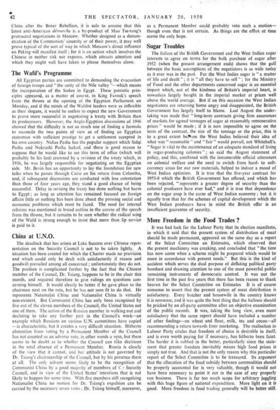Sugar Troubles
The failure of the British Government and the West Indian sugar interests to agree on terms for the bulk purchase of sugar after 1952 (when the present arrangement ends) shows that the gulf between the basic assumptions of the negotiators is as wide today as it ever was in the past. For the West Indies sugar is " a matter of life and death " ; it is " all they have to sell " ; for the Ministry of Food and the other departments concerned sugar is an essential import which, out of the kindness of Britain's imperial heart, is nowadays largely bought in the imperial market at prices well above the world average. But if on this occasion the West Indian negotiators are returning home angry and disappointed, the British Government has largely itself to blame. Last August the under- taking was made that " long-term contracts giving firm assurances of markets for agreed tonnages of sugar at reasonably remunerative prices " would be made ; if it is now impossible to• agree on the term of the contract, the size of the tonnage or the price, this is to a great extent bet use the West Indies believed their idea of what was " reasonable " and " fair " would prevail, not Whitehall's. " Sugar is vital to the maintenance of an adequate standard of living in sugar-producing colonies " ; so said the August statement of policy, and this, combined with the innumerable official utterances on colonial welfare and the need to switch from hard- to soft- currency areas for our raw materials, helped to induce a mood of West Indian optimism. It is true that the five-year contract for 1953-8 which the British Government has offered, and which has been rejected, " represents a greater degree of security than the colonial producers have ever had," and it is true that dependence on the sugar crop is the curse of West Indian economy ; but it is equally true that for the schemes of capital development which the West Indian producers have in mind the British offer is an insufficient guarantee of security.


































 Previous page
Previous page